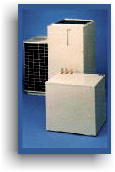|
|
||||||||
|
|
||||||||
| Water Heating/Laundry | ||||||||
| For Your Home | ||||||||
|
|
||||||||
| Heat Pump Water Heater | ||||||||
|
Types of Heat Pump Water Heaters Efficiency Ratings Maintenance Residential heat pump water heaters are an energy-efficient way to heat domestic hot water and they present a good opportunity for energy savings. Heat pump water heaters are extremely efficient alternatives to electric resistance style water heaters, often saving as much as 55% to 60% of water heating costs. Heat pump water heaters use electricity to move heat from one place to another instead of generating heat directly. To heat water for homes, heat pump water heaters work like refrigerators in reverse.
Exhaust air units extract heat from a continuously exhausted air stream and work better in colder climates because they do not cool ambient air. Some units can even be converted between the two modes of operation for optimum operation in either summer or winter. In mild climates, you can locate units in unheated but protected spaces such as garages, essentially using outdoor air as a heat source. A variation of the stand-alone heat pump water heater is the de-superheater feature available on some central air conditioners. It provides economical supplemental water heating as a byproduct of air conditioning. De-superheater water heating can be part of an integrated package with a heat pump or air conditioner system. In most such systems, the heat pump water heating only occurs during normal demand for space conditioning, with resistance electric coils providing water heating the rest of the time. During the cooling season, the de-superheater actually improves the efficiency of the air conditioning system while heating water at no direct cost. In an average climate, a de-superheater might meet 20% to 40% of annual water heating demand. Efficiency Ratings The EF is the ratio of heat output to energy input as measured during a specific 24-hour test procedure. A conventional electric resistance water heater EF would ideally be 1, but is slightly lower because of tank standby losses (heat loss through piping and tank walls). Testing procedure and calculations to determine EF are the same for all heater manufacturers. Heat pump water heater performance varies, but in typical usage, heat pump water heaters tend to operate with an EF around 2 to 2.5. This means that they heat over twice as much hot water as you would get from an electric resistance water heater with the same electrical energy input. Residential exhaust air heat pumps vary widely in capacity from about 9,000 Btu/hr to 90,000 Btu/hr and tanks range in size from 80 to 120 gallons. Contribution to air-conditioning equals about 2/3 the Btu/hr of the water heating capacity when operating as an ambient air-source unit Maintenance Repair of any water leaks at the heat pump water heater is important to prevent corrosion of any of the heat pump water heater components. In areas of hard alkaline water, scale buildup may occur on the waterside of the condenser coil. Cleaning this scale can be simple or complicated, depending on the heat pump water heater design. The technology is considerably more complex than a conventional water heater, so when repairs are necessary, they can be more costly. Parts that may require repair or replacement over the life of the heat pump water heater include compressors, water pumps, fan motors, and expansion devices. Warranties on residential heat pump water heaters typically cover parts for one to four years and labor for only a short period of time after purchase. Sources: U.S. DOE, Federal Energy Management Program, Federal Technology Alert, and U.S. DOE, Energy Efficiency and Renewable Network, Consumer Energy Information: EREC Reference Brief. EREC is operated by NCI Information Systems, Inc. for the National Renewable Energy Laboratory/U.S. Department of Energy. The content of this brief is based on information known to EREC at the time of preparation. No recommendation or endorsement of any non-U.S. Government product or service is implied if mentioned by EREC. | ||||||||
| ||||||||
|
||||||||
